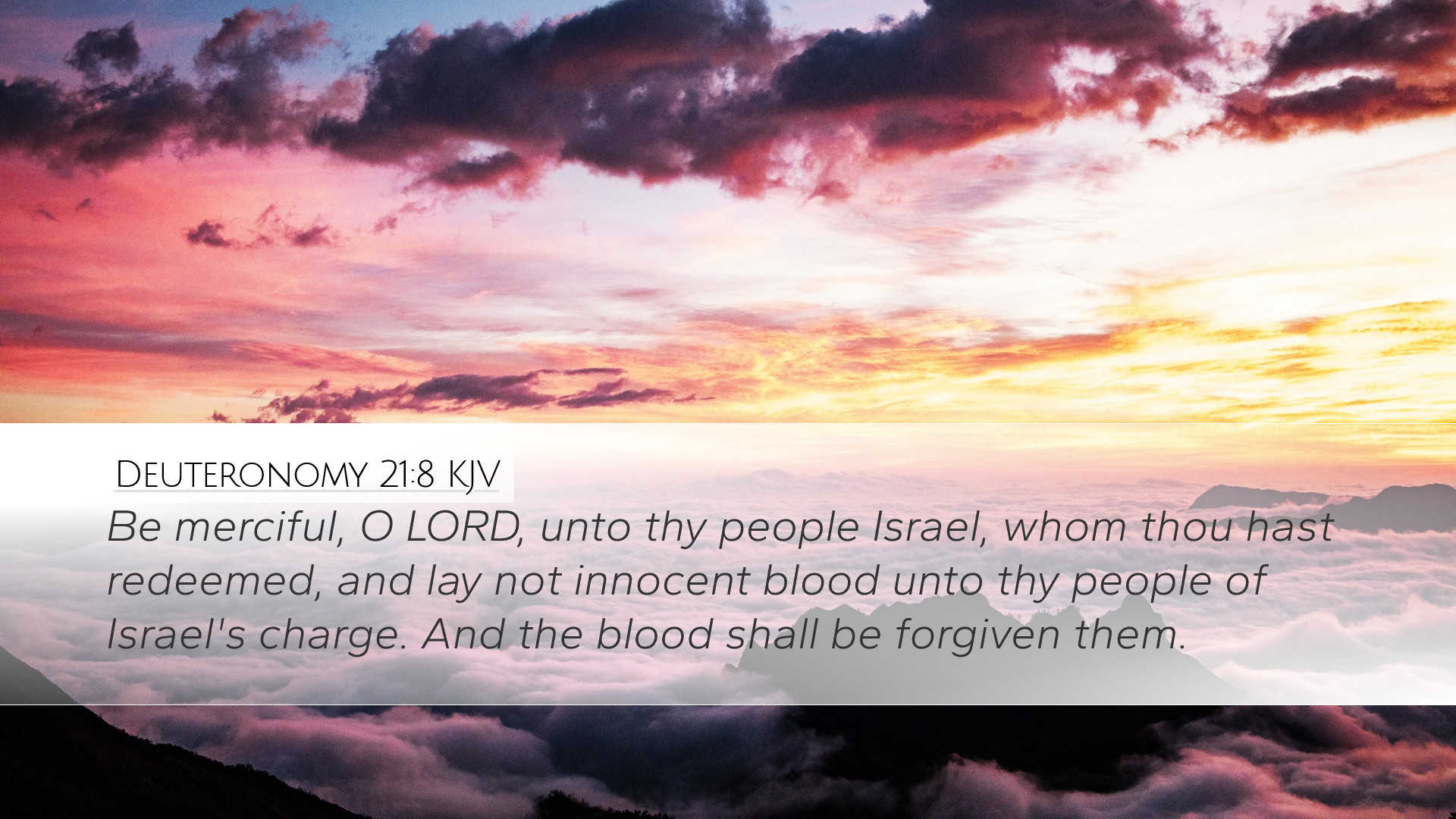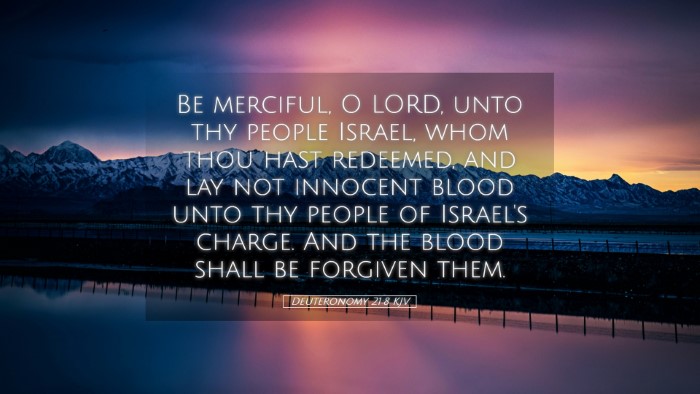Commentary on Deuteronomy 21:8
Deuteronomy 21:8 states:
"Forgive Your People, O Lord, for the bloodshed that has been caused among Your people Israel, and do not allow any of Your people to be guilty of this sin." (Deuteronomy 21:8)
Context and Background
This verse is located within a legal section of Deuteronomy wherein Moses outlines various statutes and guidelines for the children of Israel. Chapter 21 deals specifically with laws concerning murder, unsolved crimes, and the proper procedures for atonement and cleansing. The significance of bloodshed in the Israelite community is paramount, as it directly impacts their relationship with God and their standing as a holy nation.
Insights from Matthew Henry
Matthew Henry emphasizes the seriousness of bloodshed and the implications it has within the covenant community. He notes the phrase, "Forgive Your People", is a plea for divine mercy and recognizes that even in a righteous community, there are always instances of sin. Henry suggests that this call for atonement reflects a deep understanding of the nature of sin and its consequences in society. This verse serves as a template for communal confession and intercession, providing a model for modern-day believers on how to approach God regarding corporate sins.
Insights from Albert Barnes
Albert Barnes provides a detailed explanation of the social and theological context surrounding this verse. He highlights the necessity of cleansing before the Lord—suggesting that the shedding of innocent blood brings a grave transgression that demands recognition and rectification. Barnes points out that the leaders of Israel are urged to acknowledge their collective responsibility for any bloodshed, fostering a spirit of unity and accountability within the community. His commentary emphasizes the importance of intercessory prayer and the recognition that guilt can spread through the whole community, thereby necessitating a collective plea for mercy.
Insights from Adam Clarke
Adam Clarke's commentary focuses on the language of lamentation and the recognition of human fallibility. Clarke notes the direct appeal to God, demonstrating both humility and a need for divine intervention. He interprets the injunction for forgiveness as a call for God to avert judgment, reinforcing the understanding that God’s mercy is essential for the nation of Israel to thrive and recover from wrongdoing. Clarke also highlights the ties between the conduct of the people and their covenantal relationship with God, emphasizing that the acknowledgment of sin is the first step towards restoration and healing.
Theological Implications
This verse, taken in conjunction with its surrounding context, raises several theological implications:
- Corporate Responsibility: The plea for forgiveness has a communal dimension, indicating that sin affects not just the individual but the entire community.
- The Nature of God: It showcases God’s readiness to forgive and His desire for His people to be in right standing with Him.
- Atonement Practices: This reflects the broader theme of sacrificial atonement that runs throughout the Old Testament, pointing toward the ultimate sacrifice of Christ.
Application for Modern Believers
For pastors, students, theologians, and Bible scholars, there are several practical applications that can be drawn from this verse:
- Intercessory Prayer: The importance of praying for one's community and acknowledging collective sins should be a discipline in the life of every believer.
- Spiritual Accountability: Believers should foster a spirit of mutual accountability and support, recognizing that the corporate health of a church or community is affected by individual actions.
- Understanding Repentance: This verse serves as a reminder of the necessity of confession and repentance, both on a personal and communal level.
Conclusion
Deuteronomy 21:8 encapsulates profound truths about sin, community, and God's mercy. The insights drawn from the commentaries of Matthew Henry, Albert Barnes, and Adam Clarke emphasize the importance of recognizing our collective failures and approaching God with a spirit of repentance. It challenges believers today to understand the weight of sin within the community while invoking the need for God's grace and forgiveness. As we study this verse, let it draw us nearer to God in repentance, intercession, and a deeper commitment to reflecting His holiness in our lives.


